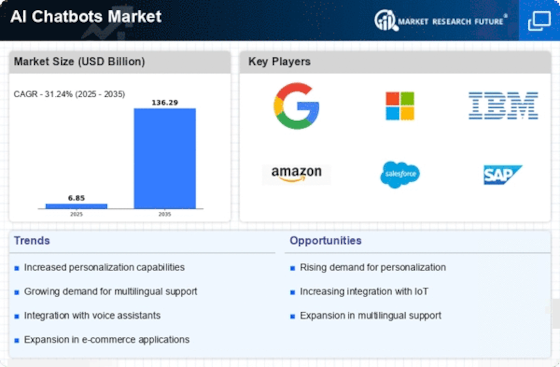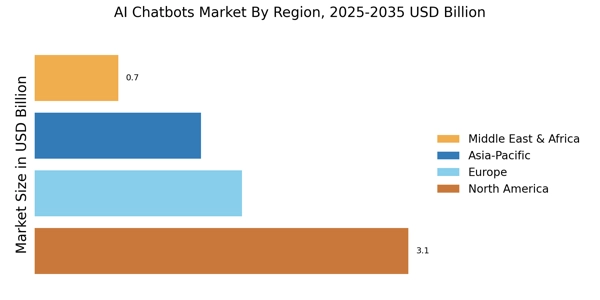Increased Focus on Data Analytics
The increased focus on data analytics within the AI Chatbots Market is reshaping how businesses interact with customers. Organizations are harnessing data collected from chatbot interactions to gain insights into customer preferences and behaviors. This analytical approach allows companies to refine their chatbot functionalities and improve service delivery. As businesses recognize the value of data-driven decision-making, investments in analytics tools are on the rise. The ability to analyze user interactions and feedback enables companies to enhance their chatbot offerings, leading to improved customer satisfaction and retention. This trend underscores the importance of data analytics in driving innovation and growth within the AI Chatbots Market.
Growing Adoption of E-commerce Solutions
The growing adoption of e-commerce solutions significantly impacts the AI Chatbots Market. As online shopping continues to gain traction, businesses are leveraging chatbots to streamline the purchasing process and enhance customer experience. Data suggests that e-commerce companies utilizing chatbots can see conversion rates increase by as much as 20%. This trend is particularly evident in sectors such as retail and travel, where chatbots assist customers in product selection, order tracking, and personalized recommendations. The integration of AI chatbots into e-commerce platforms not only improves operational efficiency but also fosters customer loyalty, thereby contributing to the overall growth of the AI Chatbots Market.
Advancements in Natural Language Processing
Advancements in natural language processing (NLP) technology significantly influence the AI Chatbots Market. Enhanced NLP capabilities enable chatbots to understand and respond to user queries with greater accuracy and relevance. This improvement fosters more engaging and human-like interactions, which are crucial for user satisfaction. As of October 2025, the market for NLP is projected to reach substantial figures, indicating a robust growth trajectory. The ability of chatbots to comprehend context and sentiment allows businesses to tailor their responses, thereby improving customer engagement. Consequently, organizations are increasingly investing in sophisticated NLP technologies to enhance their chatbot offerings, which in turn drives the expansion of the AI Chatbots Market.
Rising Demand for Customer Support Automation
The AI Chatbots Market experiences a notable surge in demand for customer support automation. Businesses increasingly recognize the efficiency and cost-effectiveness of deploying AI chatbots to handle customer inquiries. According to recent data, companies that implement chatbots can reduce operational costs by up to 30%. This trend is driven by the need for 24/7 customer service, which chatbots can provide without the limitations of human agents. As organizations strive to enhance customer satisfaction, the integration of AI chatbots into their support systems appears to be a strategic move. The ability to manage high volumes of inquiries simultaneously positions chatbots as a vital component in the customer service landscape, thereby propelling growth within the AI Chatbots Market.
Expansion of AI Technologies in Various Sectors
The expansion of AI technologies across various sectors plays a pivotal role in the growth of the AI Chatbots Market. Industries such as healthcare, finance, and education are increasingly adopting AI chatbots to improve service delivery and operational efficiency. For instance, in healthcare, chatbots assist in patient triage and appointment scheduling, while in finance, they provide instant support for customer inquiries. This diversification of applications indicates a broader acceptance of AI technologies, which is likely to fuel further investment in chatbot solutions. As organizations seek to leverage AI for competitive advantage, the proliferation of chatbots across different sectors is expected to drive substantial growth in the AI Chatbots Market.

















